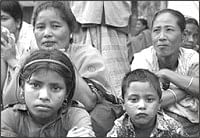Fact file
What are the rights to development for indigenous peoples?
 National development processes have often failed to include the free and meaningful participation of indigenous peoples. As a result, national development objectives and policies, as conceived by national-level officials and processes, have not always been consistent with the views, wishes and interests of indigenous peoples affected by them.
National development processes have often failed to include the free and meaningful participation of indigenous peoples. As a result, national development objectives and policies, as conceived by national-level officials and processes, have not always been consistent with the views, wishes and interests of indigenous peoples affected by them.
Some have had a serious negative impact on indigenous communities, including displacement, loss of livelihood, destruction of local environments, damage to sacred sites and, from the perspective of indigenous peoples, an intrusive, unsustainable and unplanned influx of outsiders into traditional territories. Indigenous peoples are thus often wary of programmes offered in the name of development.
While not opposed to development policies that bring improvements nationally and locally, indigenous peoples have consistently insisted that they be empowered to affect decisions that have an impact on their communities and rights.
Recognition of and respect for land and resources are fundamental to many indigenous belief systems. Experience has shown that conflicts arise when development projects take place without an understanding of, or respect for, indigenous peoples' strong spiritual attachment to and traditional association with their lands and territories.
Emerging international and State standards and practices are increasingly recognizing that indigenous peoples should have rights over their lands and development projects that affect them. Article 30 of the draft United Nations Declaration on the rights of indigenous peoples states that indigenous peoples have the right "to determine and develop priorities and strategies for the development or use of their lands, territories or other resources".
Chapter 26 of Agenda 21 of the United Nations Conference on Environment and Development calls upon intergovernmental organizations to establish a process that empowers indigenous people and their communities through, inter alia, recognition of their lands, support for alternative environmentally sound means of production and arrangements to strengthen indigenous participation in the national formulation of policies, laws and programmes relating to resource management and development that may affect them.
Rights-based development processes will give due attention to the need to avoid paternalistic or externally conceived responses. They will recognise the need to ensure the full, free, active and meaningful participation of indigenous peoples in the planning, implementation and evaluation of development policies, projects and decisions, and will recognise the potential value of indigenous contributions to such processes. They will also respect indigenous peoples' rights over their land and resources, and will obtain the prior informed consent of indigenous peoples for projects on their lands. Finally, due regard will be given to the need to ensure that indigenous peoples enjoy equitable benefits from economic activities affecting them.
The United Nations began its first formal work on indigenous people in 1982 with the establishment of the Working Group on Indigenous Populations. Since then, a wide range of activities have been undertaken as part of the Organization's human rights programme and by the United Nations system as a whole.
By resolution 2001/57, the Commission on Human Rights decided to appoint, for a three-year period, a Special Rapporteur on the situation of human rights and fundamental freedoms of indigenous people, with, inter alia, the functions of gathering and exchanging information and communications from all relevant sources and formulating recommendations and proposals to prevent and remedy violations of such human rights and fundamental freedoms.
Office of the United Nations High Commissioner for Human Rights.